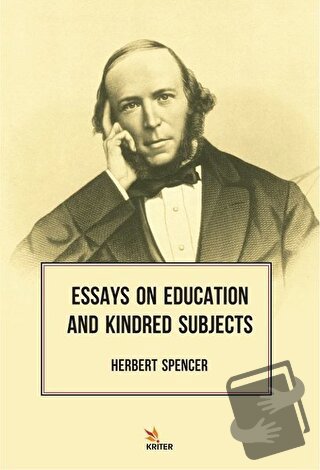
The profession of teaching has Tong been characterised by certain habitual convictions, which Spencer undertook to shake rudely, and even to deride. The first of these convictions is that all education, physical, intellectual, and moral, must be authoritative, and need take no account of the natural wishes, tendencies, and motives of the ignorant and undeveloped child. The second dominating conviction is that to teach means to tell, or show, children what they ought to see, believe, and utter. Expositions by the teacher and books are therefore the true means of education. The third and supreme conviction is that the method of education which produced the teacher himself and the contemporary or earlier scholars, authors, and publicists, must be the righteous and sufficient method. Its fruits demonstrate its soundness, and make it sacred. Herbert Spencer, in the essays included in the present volume, assaulted all three of these firm convictions. Accordingly, the ideas on education which he put forth more than fifty years ago have penetrated educational practice very slowly—particularly in England; but they are now coming to prevail in most civilised countries, and they will prevail more and more. Through him, the thoughts on education of Comenius, Montaigne, Locke, Milton, Rousseau, Pestalozzi, and other noted writers on this neglected subject are at last winning their way into practice, with the modifıcations or adaptations which the immense gains of the human race in knowledge and power since the nineteenth century opened have shown to be wise.
| Taksit Sayısı | Taksit tutarı | Genel Toplam |
|---|---|---|
| Tek Çekim | 340,00 | 340,00 |
| 3 | 123,85 | 371,55 |
| 6 | 65,39 | 392,33 |
| 9 | 45,90 | 413,13 |
| 12 | 36,16 | 433,87 |
| Taksit Sayısı | Taksit tutarı | Genel Toplam |
|---|---|---|
| Tek Çekim | 340,00 | 340,00 |
| 3 | 123,85 | 371,55 |
| 6 | 65,39 | 392,33 |
| 9 | 45,90 | 413,13 |
| 12 | 36,16 | 433,87 |
| Taksit Sayısı | Taksit tutarı | Genel Toplam |
|---|---|---|
| Tek Çekim | 340,00 | 340,00 |
| 3 | 123,85 | 371,55 |
| 6 | 65,39 | 392,33 |
| 9 | 45,90 | 413,13 |
| 12 | 36,16 | 433,87 |
| Taksit Sayısı | Taksit tutarı | Genel Toplam |
|---|---|---|
| Tek Çekim | 340,00 | 340,00 |
| 3 | 123,85 | 371,55 |
| 6 | 65,39 | 392,33 |
| 9 | 45,90 | 413,13 |
| 12 | 36,16 | 433,87 |
| Taksit Sayısı | Taksit tutarı | Genel Toplam |
|---|---|---|
| Tek Çekim | 340,00 | 340,00 |
| 3 | 123,85 | 371,55 |
| 6 | 65,39 | 392,33 |
| 9 | 45,90 | 413,13 |
| 12 | 36,16 | 433,87 |
| Taksit Sayısı | Taksit tutarı | Genel Toplam |
|---|---|---|
| Tek Çekim | 340,00 | 340,00 |
| 3 | 123,85 | 371,55 |
| 6 | 65,39 | 392,33 |
| 9 | 45,90 | 413,13 |
| 12 | 36,16 | 433,87 |
| Taksit Sayısı | Taksit tutarı | Genel Toplam |
|---|---|---|
| Tek Çekim | 340,00 | 340,00 |
| 3 | - | - |
| 6 | - | - |
| 9 | - | - |
| 12 | - | - |
The profession of teaching has Tong been characterised by certain habitual convictions, which Spencer undertook to shake rudely, and even to deride. The first of these convictions is that all education, physical, intellectual, and moral, must be authoritative, and need take no account of the natural wishes, tendencies, and motives of the ignorant and undeveloped child. The second dominating conviction is that to teach means to tell, or show, children what they ought to see, believe, and utter. Expositions by the teacher and books are therefore the true means of education. The third and supreme conviction is that the method of education which produced the teacher himself and the contemporary or earlier scholars, authors, and publicists, must be the righteous and sufficient method. Its fruits demonstrate its soundness, and make it sacred. Herbert Spencer, in the essays included in the present volume, assaulted all three of these firm convictions. Accordingly, the ideas on education which he put forth more than fifty years ago have penetrated educational practice very slowly—particularly in England; but they are now coming to prevail in most civilised countries, and they will prevail more and more. Through him, the thoughts on education of Comenius, Montaigne, Locke, Milton, Rousseau, Pestalozzi, and other noted writers on this neglected subject are at last winning their way into practice, with the modifıcations or adaptations which the immense gains of the human race in knowledge and power since the nineteenth century opened have shown to be wise.











